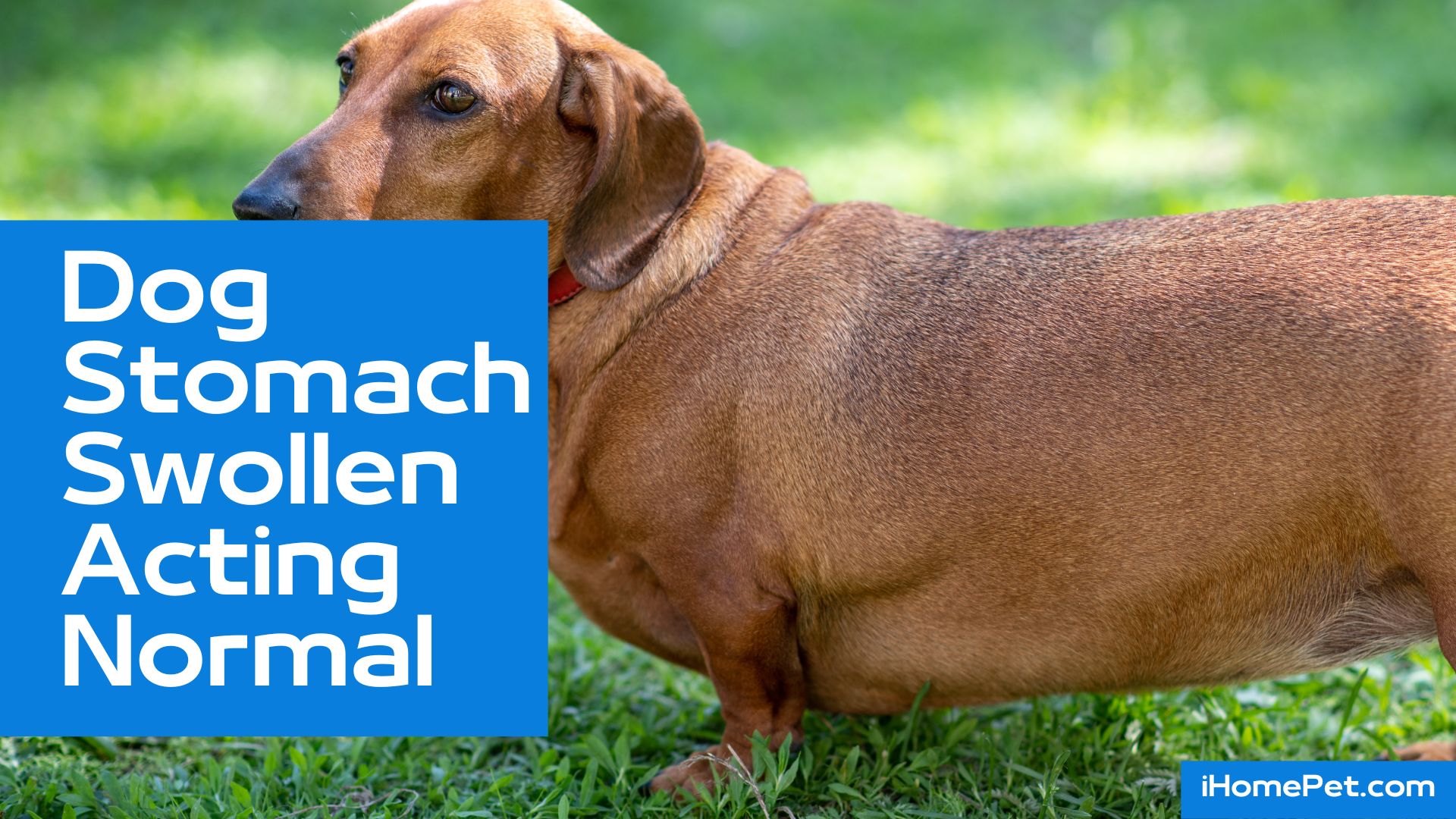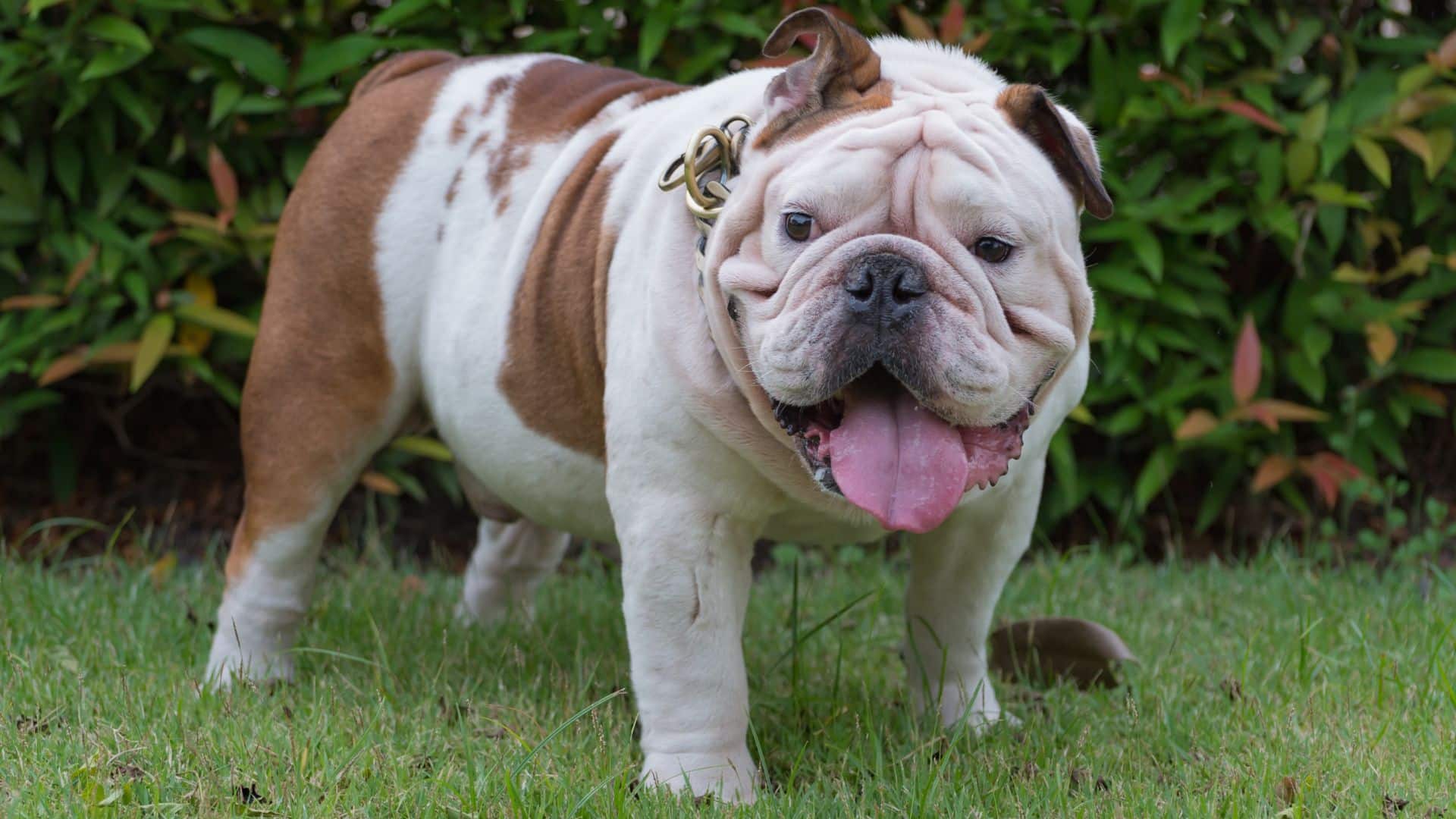Having a dog stomach swollen acting normal could mean various things. These things could vary from a simple case of too much food or bloating to more serious cases. The pot-bellied look could also be a sign of underlying health issues such as organ dysfunction or parasites.
A swollen stomach in your dog is a concerning issue for most dog owners. Worse still is when your dog acts normally despite the swollen abdomen. You expect the dog to show you some signs so that you know what could be wrong with her and figure out how to help her.
Possible causes when your dog’s stomach appears bloated

Swollen stomachs are a common occurrence, even in us humans. It occurs in man’s best friend too. What causes these swellings can be the same or different for dogs and humans. Some causes include uterine infection,
The term commonly used to express a more severe state of this condition in dogs is bloating. Bloating can be accompanied by excruciating pain or just a typical swelling which goes away after some time.
Bloating is more serious and should not be taken lightly. Seek medical attention immediately you notice a swollen stomach accompanied by whines and growls from your dog.
#1. Too much food
There are dogs who like to devour their food to every last piece. You add him another, and he eats the whole of it. If you have such a dog, then the chances of experiencing a swollen stomach are very high. In such a case, the dog would ordinarily behave normally as the inflammation would dissipate after an hour or so.
To prevent your dog from overindulging in food, provide him with a schedule of frequent meal times served in smaller quantities. To help your dog live a longer life, you should refrain from feeding your dog in large quantities, as this is a common practice among dog owners.
If your dog eats too much, do not take him or her out for a walk. Wait until your dog’s stomach has processed the dry food before engaging in any physical activity to prevent digestive issues.
#2. Swallowing something she shouldn’t
As your pooch plays around, she is bound to pick stuff up that she should not. This is most common in puppies. If you do not keenly watch your dog and she swallows these stuff, reactions are bound to occur in her stomach.
These cause the formation of gas as by-products. It is the gas that swells up the stomach when it accumulates over time. This is temporary though.
After some time, the gas would subside and so does the inflammation. If it does not, seek immediate medical attention and x-ray services as the dog could have swallowed sharps and indigestible objects.
#3. She could be pregnant
Well isn’t this too obvious? It is uncommon for pregnant dogs to whine and growl all day. She would behave normally and go about her routine. It could be her first time, or you could be a new dog owner who has never handled a pregnant dog before, the swelling should therefore not be a concerning issue.
#4. Tumor
A growth in your dog’s stomach wall could be the cause of the swelling in her stomach. A tumor would not be painful in the initial stages. However, if it advances, you will notice the dog sleeping on one side continuously.
Furthermore, a kidney disease or kidney failure can also cause your pup’s stomach to appear swollen. Other potential causes include digestive issues or a blockage in the intestines.
#5 Liver disease
The lack of water combined with stomach swelling in older dogs can lead to liver disease. This is because dehydration can impair the liver’s ability to function properly, leading to a buildup of toxins in the body.
Fluid buildup can result in a swollen belly and discomfort for the dog. Additionally, the bloated belly can put pressure on the liver, further exacerbating the risk of developing liver failure in dogs.
Liver dysfunction can cause a variety of symptoms in dogs, including jaundice, loss of appetite, and lethargy. It is important to monitor your dog’s water intake and ensure they stay properly hydrated to help prevent a life threatening situation.
#6 Heart failure
A dog suffering from internal bleeding will need a surgical procedure to stop the bleeding and save its life. Blood flow is crucial for most dogs to survive and maintain optimal health.
For this condition, shock treatment using intravenous fluids must begin immediately to stabilize the dog’s blood pressure. Heart disease is a serious condition that requires careful monitoring and management by a veterinarian.
#7 Gastric dilatation volvulus (GDV)
Gastric dilation volvulus, also known as “twisted stomach,” is a serious, life-threatening condition that requires emergency surgery and needs to be treated immediately to prevent serious diseases and potentially save the dog’s life.
It happens when your dog’s belly rotates and traps excess gas that blocks the stomach’s blood supply and can lead to tissue damage or death if not promptly corrected.
Your dog’s stomach fills with this gas, typically because it starts swallowing air after eating or drinking too quickly. Both the entrance and the exit of the dog’s belly can become blocked, and your dog may experience severe discomfort or pain.
Here are some breeds that are predisposed to GDV:
- Basset hounds
- Great danes
- German shepherds
- Doberman pinschers
- Irish setters
- Saint bernards
- Gordon setters
Ensure that your vet removes any infected fluids from the stomach and performs the necessary surgery to untwist the stomach and restore blood flow. This procedure, known as a gastropexy, can help prevent future episodes of bloat in your dog.
Bloated Stomach: The Do’s And Don’ts

Most of us get into panic mode when you notice the slightest of changes in your best friend. It is with a good reason though. This should not be a reason to go overdrive though. If the dog is behaving normally with a swollen stomach, you are advised to let her work it out herself.
If it does not subside, that is when you need to take appropriate action. Any underlying health problems would arise with the diagnostic tests and imaging studies performed by the veterinarian.
Consult your vet immediately
The vet would then conduct a detailed diagnosis of what could be ailing your dog. X-ray examinations would reveal what could be ailing the dog. Whether it is a growth or blocked objects in her stomach, you will be in a good position to know everything.
A physical examination can help you identify your dog’s condition and the underlying cause of the bloated belly. Any medical emergency that your four-legged friend has should be addressed immediately by a veterinarian.
You should perform surgical correction in severe cases that require immediate attention so that your dog’s stomach returns to its normal position and alleviates any potential complications.
Do not give your dog folk remedies
You may have heard of some stomach swell remedies somewhere, that is not a license to try it out on your dog. Some of these worsen the condition or make treatment a lot harder. What can you do to treat bloat belly?
Deep-chested breeds that have a serious infection or a particular disease will need veterinary attention immediately. It is important to consult with a veterinarian to determine the underlying cause of the stomach swell and receive appropriate treatment.
Closely monitor your dog
The most common causes of stomach swells are just inappropriate eating habits or something they shouldn’t altogether. Carefully watch your friend and what he gulps down. If you notice any other symptoms like decreased appetite or weight loss, you should take your pet to a veterinarian to get him examined.
An untreated bloated belly or stomach bloat can be extremely painful for your pet. This way, you can reduce your dog’s risk of developing a serious condition known as Gastric Dilatation Volvulus (GDV). By being vigilant and proactive in monitoring your dog’s eating habits, you can help prevent this potentially fatal condition.
Take Good Care Of Your Dog: Swollen Stomach on affected dogs
A swollen or distended abdomen in dogs can be a sign of various underlying health issues. When you notice the dog bloat symptoms, you need to be the leader and be calm for the two of you. You don’t need to get panicked and confused about it.
The dog would, in most cases, overcome the swelling by himself after an hour or so. Also, this swelling is different from the more serious case of bloating, and there is no need to get worried.
If your dog’s pituitary gland is producing too many hormones, then your pet could be suffering from Cushing’s disease. According to veterinary medicine, most medical conditions, like Cushing’s syndrome, can be managed with proper treatment and medication.
It is important to consult with a veterinarian to determine the best course of action for your dog’s specific condition. Here are some things you can do to prevent GDV:
- Stay away from any canned food with preservatives and high sodium.
- Control the food intake to prevent any extra weight gain.
- Perform x-rays in the abdominal area to determine the pet’s condition.
- Check the family history with the breeder to verify previous tumors on the adrenal glands.
- Do not walk with your dog if he or she has a full stomach. Wait a few hours after feeding before engaging in any physical activity.
- Help boost your pet’s immune system.
Other infections should not be left untreated for many reasons, including the risk of complications and the spread of disease to others.
Last Updated on 16/03/2025 by Karen Snow
Hi! I’m Karen and a certified dog lover. As a freelance writer and blogger, I do my best to squeeze in some time with my dogs, learning more about the way they act and how I can make sure that they continue to stay well-cared for by yours truly.
My dogs have helped me through a lot, and this is my way of giving back to them! Besides animals, I also love to travel and cook, having explored my country’s restaurants and unique places. Follow me as I show you all the amazing tips and bits of information I learn along the way about our furry friends!
